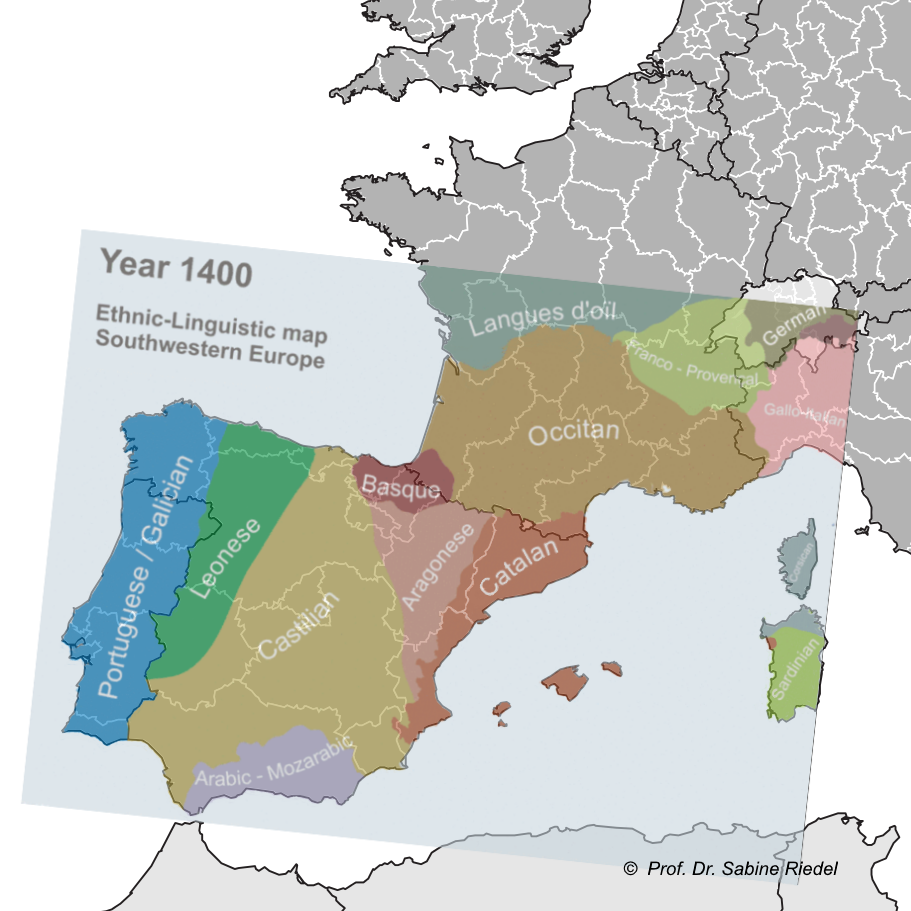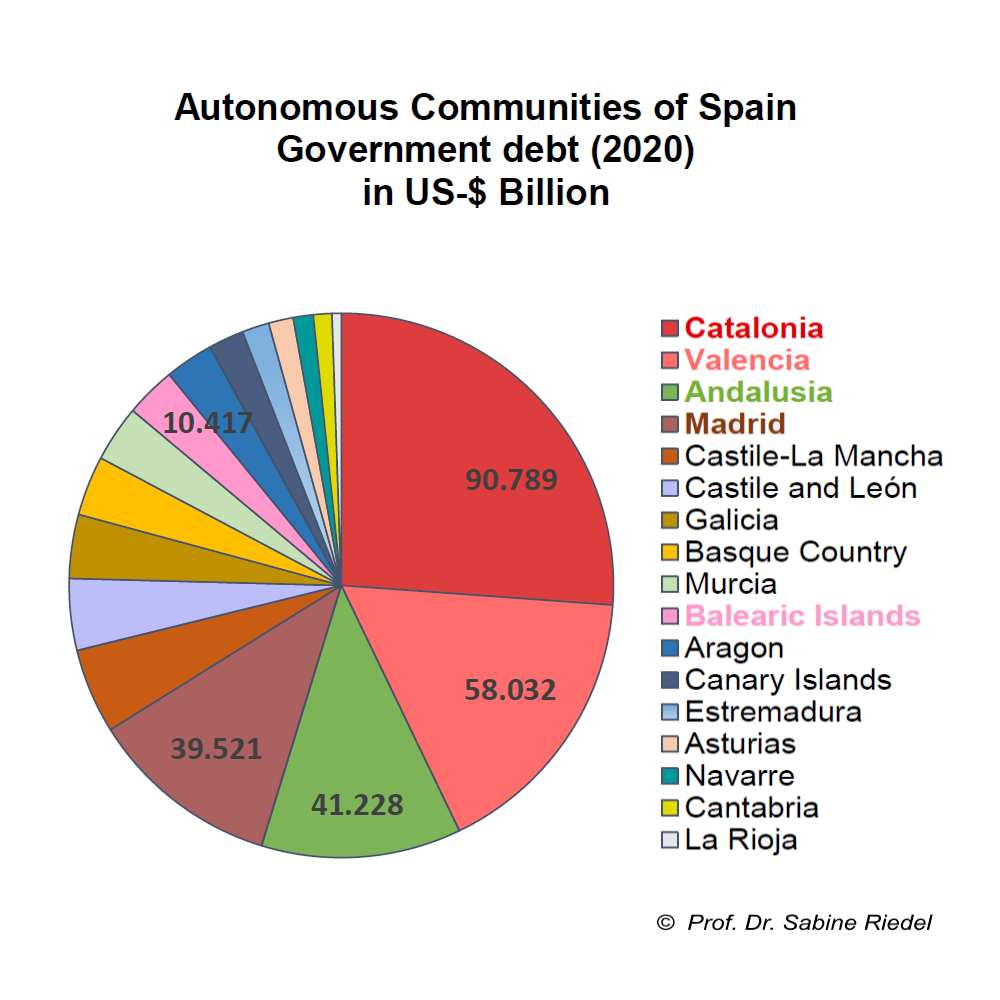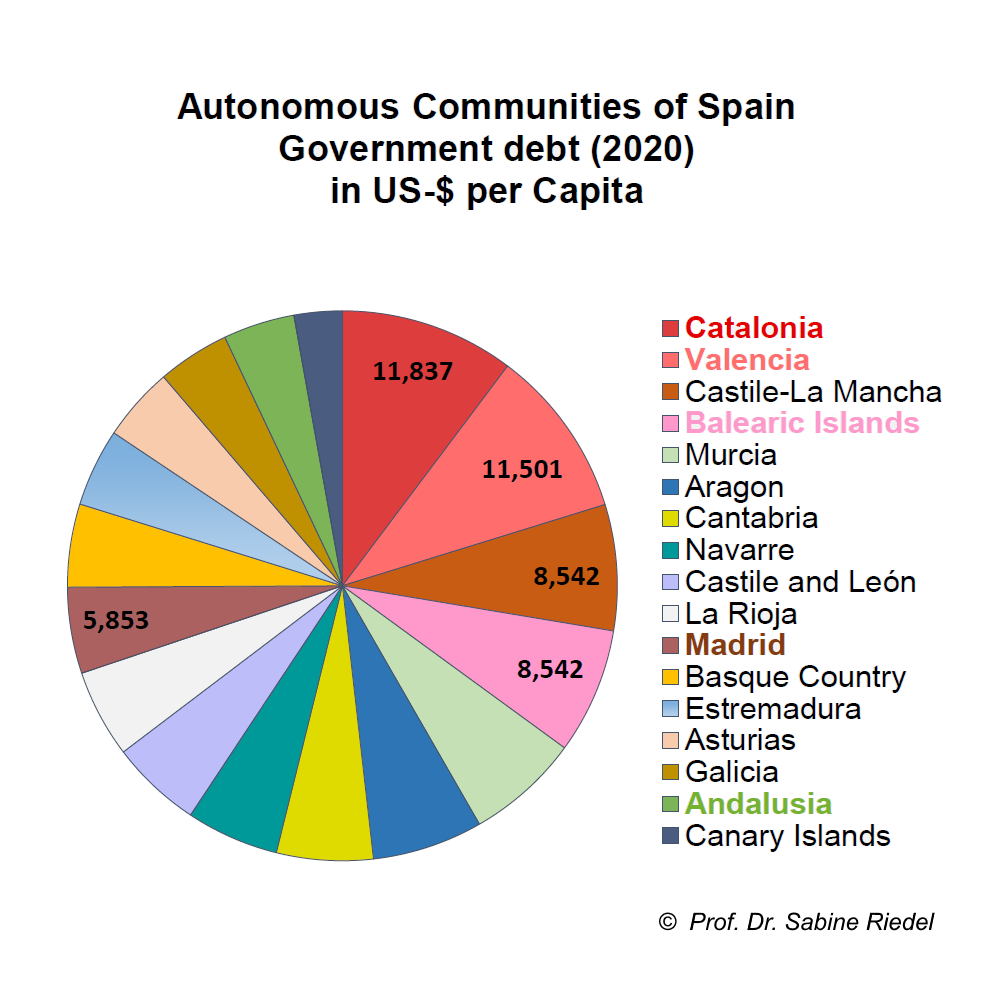TOPIC 2021 / 4
SABINE RIEDEL
Cf. PUBLICATION: The Catalan Separatism: Uncompromising but „pro-European“, in: Forschungshorizonte Politik & Kultur, Vol. 5, 2021/9, 16 pages.
 A SIENTIFIC RESPONSE TO MEDIA NARRATIVES
A SIENTIFIC RESPONSE TO MEDIA NARRATIVES “Alghero [Italian coastal town in Sardinia, cf. the map] is deeply connected to the Catalan culture and language [of Spain]. For me, it is very important to be here today – and in freedom. I am used to being persecuted by Spain. But in the end it’s always the same: I’m free and I keep fighting.” Source:
(Carles) Puigdemont: Frei und glücklich in „Klein Barcelona”, euronews.com, 25.9.2021 (English translation: S. R.); see also: Carles Puigdemont leaves custody in Italy as Sánchez urges him to ‘submit to Spanish justice’, euroniews.com, 25.9.2021.
The former Catalan minister-president Carles Puigdemont is currently attracting media attention. From his exile in Brussels, he visited Sardinia on 24.9.2021 to participate in a Catalan cultural festival. This gave him the opportunity to meet his successor in office, Pere Aragonès, and other supporters of the Catalan independence movement. Since the European Parliament had lifted his immunity as a member of parliament on 9.3.2021, the Spanish authorities were able to demand that Italy execute the European arrest warrant against him.
He was indeed arrested for a few hours, so was able to show himself again with his supporters and return to Brussels unmolested. The Italian court, meanwhile, postponed its decision and referred to the European Court of Justice (ECJ), which is currently examining Puigdemont’s appeal against the waiver of his immunity. This factual situation reflects the legal dimension of the Catalonia conflict: Tensions are growing between the national and supranational EU levels.
In view of the popularity of Puigdemont, the reason for his visit has taken a back seat. The festival was not only about Catalan, but also Sardinian culture. It should demonstrate the close alliance between separatist regional parties within the EU. Their political programs refer to the cultural dimension of the Catalonia conflict: A reallocation of the EU member states along language borders. That is why they first fight for recognition as a separate (language) nation within their respective central state.
This indicates the political dimension: the separatist parties next invoke the ” right of self-determination of peoples”, i.e. the supposed right to found their own state. The media discourse is not only lacking an explanation about this. The economic dimension of the Catalonia conflict is completely left out. This threatens the EU and especially the members of the Eurozone: The debts of Catalonia are growing steadily and the search for new lenders is proving to be the real problem. …
Sources:
Own compilation, assembly of two maps:
1. intra-Spanish borders of the autonomous communities, cf. NUTS 2 regions of the EU, 2007, wikipedia, 29.4.2010,
2. distribution of Catalan around 1400, reconstructed maps by:
Alexandre Vigo, Chronological map showing linguistic evolution in southwest Europe from A.D. 1000-2000, in: History of Catalan, wikipedia, 14.6.2009.
See: Sabine Riedel, The Catala Separatism: Uncompromising but “pro-European”, Forschungshorizonte Politik & Kultur, Vol. 5, 2021/9, 16 pages.

 EUROPEAN DIMENSIONS OF THE CATALAN-CONFLICT
EUROPEAN DIMENSIONS OF THE CATALAN-CONFLICTDIE CULTURAL DIMENSION: CATALONIA HAS ALWAYS BEEN MULTILINGUAL
♦ Contrary to the language maps shown above (cf. page 3), Catalan was created in mutual contact with other cultures. It has always been in a multi-lingual milieu, which was revived and strengthened by a democratic language policy after the Franco dictatorship (1975).
♦ The historical multilingualism of Catalonia intensified in the 20th century through internal Spanish migration and from 2000 by immigration from Latin America. A language policy that seeks to make Catalan the only official language has a discriminatory effect.
♦ The Catalan language policy not only calls into question the (Castilian-) Spanish official language, but also the distinctiveness of neighboring Romance language variants. It describes the dialects of Valencia and the Balearic Islands as variants of Catala.
♦ Multilingualism is increasingly viewed negatively und as an ideological instrument of the central government to ensure the supposed dominance of Spanish. With this argument, the population is cut off from the cultural heritage of their ancestors and from a world language.
THE POLITICAL DIMENSION: CATALONIA HAS NO “RIGHT TO SELF-DETERMINATION”
♦ The „right to self-determination“ was incorporated into international law about 100 years ago and today it supports the member states of the United Nations (UN) in their independent political and economic development. It does not refer to territories or regions.
♦ Under no circumstances can regions that enjoy autonomy rights to protect their regional cultures invoke this right to self-determination. This applies in particular to Catalonia and the Basque Country, whose special rights are far above the level of other Spanish communities.
♦ On the contrary, it should be noted that Catalan and Basque separatism violate international law. The reconstruction of historical state borders according to cultural models calls into question today’s state borders, especially with France and Italy.
♦ With its demand for independence, Catalonia is endangering peace in Europe. Because a number of EU members will never recognise it for fear of copycat effects. On the other hand, it finds global supporters (e.g. in China, Russia, etc.) who benefit from an EU crisis.
THE ECONOMIC DIMENSION: CATALAN SEPARATISM IS ABOUT MONEY
♦ Catalonia is not only the richest autonomous community in Spain, but also the one with the highest public debt. Since the Spanish banking crisis in 2012, the central government has had to support Catalonia with loans from the liquidity fund, i.e. with money from all Spanish regions.
♦ It is true that under the socialist government, Catalonia received special conditions for granting domestic Spanish loans. But it has also given Madrid more control over regional financial policy, from which Barcelona would like to free itself in the longer term.
♦ Catalonia’s s declared goal is full financial self-government. But this puts Spain at risk of a growing public debt, which today is already over 100 percent of gross domestic product (GDP), 40 percent above the critical level of the Euro Stability Pact.
♦ From statehood, Catalonia expects direct access to funds from the European Central Bank (ECB). That is why Carles Puigdemont did not proclaim Catalonia’s independence in October 2017. This would have led to Catalonia leaving the EU and the Eurozone.


Sources: Own compilation, see: Sabine Riedel, The Catala Separatism: Uncompromising but “pro-European”, Forschungshorizonte Politik & Kultur, Vol. 5, 2021/9, 16 pages, p. 9, Data from: Autonomous commutities of Spain Government debt. Stand: 14.10.2021.
THE LEGAL DIMENSION: COMPETITION BETWEEN NATIONAL AND EU LAW
♦ Despite the clear legal situation at the supranational EU level, according to which breaking away from Spain would be equivalent to leaving the EU, the Catalan regional government is hoping for a “creative solution” to the Catalonia crisis, for a settlement beyond the EU treaties.
♦ Catalonia is hoping for growing competition between national and EU law. It speculates on an emergency in which the supranational level recognises Catalonia for fear of the state collapse of a member of the Eurozone, even against Madrid’s resistance.
♦ The European Free Alliance (EFA), a European umbrella organisation made up of “47 nationalist, regionalist and autonomist parties” (quote: e-f-a.org), has already worked out a programme for this purpose: Through an “internal EU enlargement“, the EU-27 is to become an EU-50 plus.
♦ The current controversy over Carles Puigdemont’s extradition to Spain indicates growing tensions between national courts and the European Court of Justice (ECJ). At the moment, the ECJ still has to bow to Spanish laws. …
 SABINE RIEDEL IN THE SCIENTIFIC DISCOURSE ON THE TOPIC:
SABINE RIEDEL IN THE SCIENTIFIC DISCOURSE ON THE TOPIC:Sabine Riedel, The Catala Separatism: Uncompromising but “pro-European”, Forschungshorizonte Politik & Kultur, Vol. 5, 2021/9, 16 pages.
Emma-Katharina David, Sabine Riedel, Europe’s Regions: Bridges or Subjects of Disputes? Theoretical Background and the Example of Multilingualism in Trentino-South Tyrol, Italy, Forschungshorizonte Politik & Kultur, Vol. 3, 2019/9, 10 pages.
Sabine Riedel, Independence Movements in the EU? How Separatism Takes over and Endangers Europe as a Peace Concept, Forschungshorizonte Politik & Kultur, Vol. 3, 2019/3, 8 pages.
Sabine Riedel, Secession or Solidarity. Catalonia Will Not Get Both Simultaneously, in: SWP-Comment 2018/C 22, 18.5.2018, 8 pages.
Español:
Sabine Riedel, Secesión o solidaridad. Ambas cosas no conseguirá Cataluña, Forschungshorizonte Politik & Kultur, Vol. 4, 2020/10, 6 páginas.
Sabine Riedel, ¿Movimientos separatistas en la UE? Cómo el separatismo se apodera del concepto de paz de Europa y pone en peligro, Forschungshorizonte Politik & Kultur, Vol. 3, 2019/4, 8 páginas.
Sabine Riedel, Nacionalismo regional Retos políticos de una Europa en crisis, in: Joan Oliver Araujo (Ed.): El futuro territorial del estado español: ¿centralización, autonomía, federalismo o secesión?, Tirant Lo Blanch, Valencia 2014, p. 693-708.
 THIS IS PARTICULARLY RELEVANT FOR RESEARCHERS:
THIS IS PARTICULARLY RELEVANT FOR RESEARCHERS:Barrios, Harald, 1997: Das politische System Spaniens, in: Wolfgang Ismayr (Hrsg.): Die politischen Systeme Westeuropas, Opladen, S. 549–587 (551).
Der Generalstaatsanwalt des Landes Schleswig-Holstein 2017: Auslieferungssache 004 AuslA 18/18 GenStA Schleswig, 01.06.2018, S. 7–8.
Estado catalán […] en la creación de una Confederación de pueblos ibéricos, in: La Vangardia vom 15.04.1931, sowie: span. „Estado catalán dentro de la república federal española”.
European Free Alliance 2019: 2019 Manifesto. European Elections, Brüssel, S. 26.
Hrbek, Rudolf, Martin Große Hüttmann, Carmen Thamm (Hg.), Autonomieforderungen und Sezessionsbestrebungen in Europa und der Welt. Beweggründe – Entwicklungen – Perspektiven, Baden-Baden 2020.
Vertrag über die Europäische Union, konsolidierte Fassung 2016, Eur-Lex, Der Zugang zum EU-Recht.
García Morales, María Jesús 2019: Bundeszwang und Sezession in Spanien: Der Fall Katalonien, in: Die Öffentliche Verwaltung, DÖV, 72. Jg. Heft 1, S. 1–13, (8).